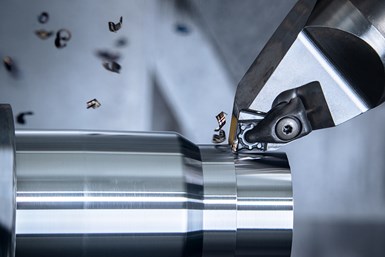Ceratizit EcoCut Multifunctional Tools for Drilling, Turning
IMTS 2022: The company says the tools can reduce setup time and increase productivity, and are designed to handle up to four different machining processes with just one tool.
Edited by
Angela Osborne
Managing Editor, Gardner Business Media

Photo Credit: Ceratizit
Ceratizit’s multifunctional EcoCut tools are designed to help manufacturers enhance their quality, productivity and output — whether for drilling, with stationary or rotating tools or for turning face, inner and outer contours. These tools are available in three versions: EcoCut Classic, EcoCut Mini and EcoCut ProfileMaster which address various diameters and bores for high performance in steel, stainless steel and high-temperature materials.
The tools are said to reduce setup time and increase productivity, and are designed to handle up to four different machining processes with just one tool. Different machining processes are combined, changing tools is no longer necessary, setup time is greatly reduced and machine capacity is increased. The launch of the three carbide grades with Dragonskin coating also ensures the machining of a wide range of materials and different applications, the company says.
The EcoCut Classic is the insert version which machines diameters between 8 and 32 mm; EcoCut Mini is a solid carbide version of the tool for bores from Ø 2-8 mm; and EcoCut ProfileMaster is suitable for bores from a diameter of 10 mm. Axial and radial recesses can also be made.
The cutting tools feature Dragonskin coating for further enhancement of their performance and wear resistance. The Dragonskin multilayer coating is said to lower heat and lessen tool wear. To prevent cutting edge waste and detect wear easily, the gold-colored TiN outer layer of the Dragonskin multilayer CVD Ti(C,N)/Al2O3/TiN coating acts as an indicator. It enables users to identify wear clearly and index before a breakage while it prevents sharp cutting edges from going unused or an insert being discarded prematurely. In addition, a mechanical postcoating treatment is said to produce beneficial residual stress in the coating for increased process security.



